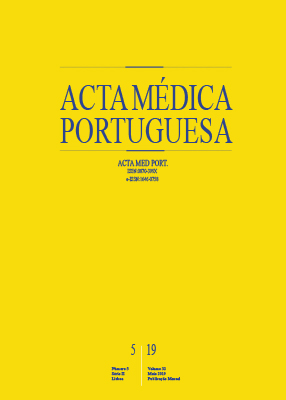Needs for Care and Service Use in Dementia: Baseline Assessment of Portuguese Participants in the Actifcare Cohort Study
DOI:
https://doi.org/10.20344/amp.11136Keywords:
Caregivers, Dementia, Health Services Accessibility, Needs Assessment, PortugalAbstract
Introduction: People with dementia and their relatives should have timely access to formal care in the community. The EU-Actifcare project analysed access to and use of formal services, as related to unmet needs for care. We describe the cohort study implementation and baseline results in Portugal, with a focus on needs for care and service use assessments.
Material and Methods: Our convenience sample consisted of 66 dyads of community-dwelling people with mild to moderate dementia and no significant use of formal services, and their informal carers. Measures included the Camberwell Assessment of Need for the Elderly and Resources Utilization in Dementia.
Results: People with dementia had unmet needs (mean 1.1; SD 1.7), mainly regarding company (23%), psychological distress (20%), and daily activities (14%). Family caregivers spent 150 minutes/day (median) providing support, and 44% had psychological distress unmet needs. Problems with access to or use of formal services, when present, were frequently due to attitudes or lack of knowledge of any or both members of the dyad.
Discussion: The recruitment process was challenging, since the inclusion criteria were restrictive. Not claiming generalizability, we recruited a typical sample of Portuguese people with mild to moderate dementia and no significant formal community support. Levels and type of unmet needs found in some participants would call for formal support, were it not for problems regarding access or use.
Conclusion: There are difficulties regarding timely access and effective use of formal care in dementia, along with relevant unmet needs.
Downloads
Downloads
Published
How to Cite
Issue
Section
License
All the articles published in the AMP are open access and comply with the requirements of funding agencies or academic institutions. The AMP is governed by the terms of the Creative Commons ‘Attribution – Non-Commercial Use - (CC-BY-NC)’ license, regarding the use by third parties.
It is the author’s responsibility to obtain approval for the reproduction of figures, tables, etc. from other publications.
Upon acceptance of an article for publication, the authors will be asked to complete the ICMJE “Copyright Liability and Copyright Sharing Statement “(http://www.actamedicaportuguesa.com/info/AMP-NormasPublicacao.pdf) and the “Declaration of Potential Conflicts of Interest” (http:// www.icmje.org/conflicts-of-interest). An e-mail will be sent to the corresponding author to acknowledge receipt of the manuscript.
After publication, the authors are authorised to make their articles available in repositories of their institutions of origin, as long as they always mention where they were published and according to the Creative Commons license.









